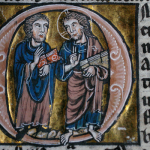Welcome to the fourth day of our Lenten Bible study through Mark’s gospel. You may find the study is posted late today as I am in San Bernadino CA leading a parish mission. If you are just getting started and joining us late, you can use the “Categories” tool on the blog to follow the earlier studies from last week. Just click on “Blobble Study”. If you are enjoying the Bible study, why not evangelize easily by sharing the post... Read more















